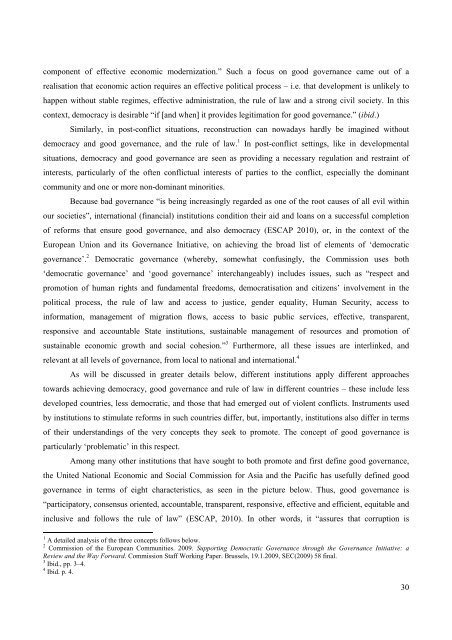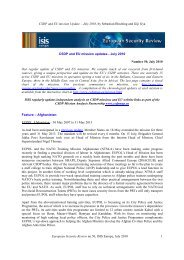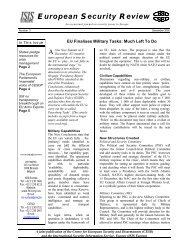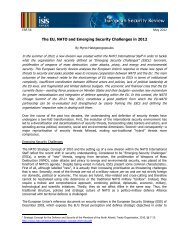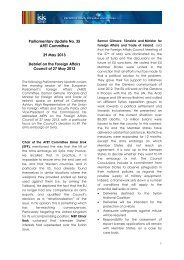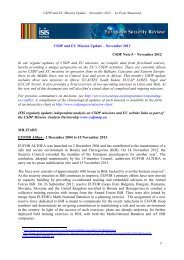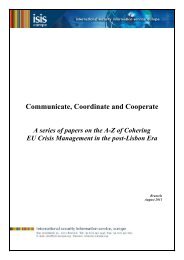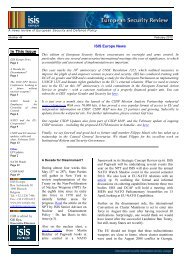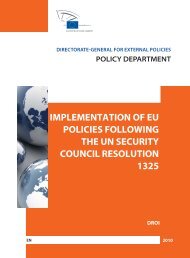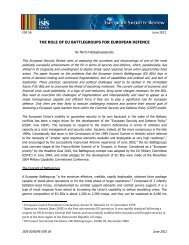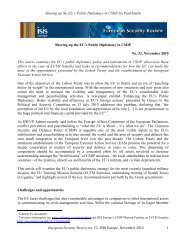Multipart thematic paper on multi-stakeholder ... - ISIS Europe
Multipart thematic paper on multi-stakeholder ... - ISIS Europe
Multipart thematic paper on multi-stakeholder ... - ISIS Europe
You also want an ePaper? Increase the reach of your titles
YUMPU automatically turns print PDFs into web optimized ePapers that Google loves.
comp<strong>on</strong>ent of effective ec<strong>on</strong>omic modernizati<strong>on</strong>.” Such a focus <strong>on</strong> good governance came out of a<br />
realisati<strong>on</strong> that ec<strong>on</strong>omic acti<strong>on</strong> requires an effective political process – i.e. that development is unlikely to<br />
happen without stable regimes, effective administrati<strong>on</strong>, the rule of law and a str<strong>on</strong>g civil society. In this<br />
c<strong>on</strong>text, democracy is desirable “if [and when] it provides legitimati<strong>on</strong> for good governance.” (ibid.)<br />
Similarly, in post-c<strong>on</strong>flict situati<strong>on</strong>s, rec<strong>on</strong>structi<strong>on</strong> can nowadays hardly be imagined without<br />
democracy and good governance, and the rule of law. 1 In post-c<strong>on</strong>flict settings, like in developmental<br />
situati<strong>on</strong>s, democracy and good governance are seen as providing a necessary regulati<strong>on</strong> and restraint of<br />
interests, particularly of the often c<strong>on</strong>flictual interests of parties to the c<strong>on</strong>flict, especially the dominant<br />
community and <strong>on</strong>e or more n<strong>on</strong>-dominant minorities.<br />
Because bad governance “is being increasingly regarded as <strong>on</strong>e of the root causes of all evil within<br />
our societies”, internati<strong>on</strong>al (financial) instituti<strong>on</strong>s c<strong>on</strong>diti<strong>on</strong> their aid and loans <strong>on</strong> a successful completi<strong>on</strong><br />
of reforms that ensure good governance, and also democracy (ESCAP 2010), or, in the c<strong>on</strong>text of the<br />
<strong>Europe</strong>an Uni<strong>on</strong> and its Governance Initiative, <strong>on</strong> achieving the broad list of elements of ‘democratic<br />
governance’. 2 Democratic governance (whereby, somewhat c<strong>on</strong>fusingly, the Commissi<strong>on</strong> uses both<br />
‘democratic governance’ and ‘good governance’ interchangeably) includes issues, such as “respect and<br />
promoti<strong>on</strong> of human rights and fundamental freedoms, democratisati<strong>on</strong> and citizens’ involvement in the<br />
political process, the rule of law and access to justice, gender equality, Human Security, access to<br />
informati<strong>on</strong>, management of migrati<strong>on</strong> flows, access to basic public services, effective, transparent,<br />
resp<strong>on</strong>sive and accountable State instituti<strong>on</strong>s, sustainable management of resources and promoti<strong>on</strong> of<br />
sustainable ec<strong>on</strong>omic growth and social cohesi<strong>on</strong>.” 3 Furthermore, all these issues are interlinked, and<br />
relevant at all levels of governance, from local to nati<strong>on</strong>al and internati<strong>on</strong>al. 4<br />
As will be discussed in greater details below, different instituti<strong>on</strong>s apply different approaches<br />
towards achieving democracy, good governance and rule of law in different countries – these include less<br />
developed countries, less democratic, and those that had emerged out of violent c<strong>on</strong>flicts. Instruments used<br />
by instituti<strong>on</strong>s to stimulate reforms in such countries differ, but, importantly, instituti<strong>on</strong>s also differ in terms<br />
of their understandings of the very c<strong>on</strong>cepts they seek to promote. The c<strong>on</strong>cept of good governance is<br />
particularly ‘problematic’ in this respect.<br />
Am<strong>on</strong>g many other instituti<strong>on</strong>s that have sought to both promote and first define good governance,<br />
the United Nati<strong>on</strong>al Ec<strong>on</strong>omic and Social Commissi<strong>on</strong> for Asia and the Pacific has usefully defined good<br />
governance in terms of eight characteristics, as seen in the picture below. Thus, good governance is<br />
“participatory, c<strong>on</strong>sensus oriented, accountable, transparent, resp<strong>on</strong>sive, effective and efficient, equitable and<br />
inclusive and follows the rule of law” (ESCAP, 2010). In other words, it “assures that corrupti<strong>on</strong> is<br />
1 A detailed analysis of the three c<strong>on</strong>cepts follows below.<br />
2 Commissi<strong>on</strong> of the <strong>Europe</strong>an Communities. 2009. Supporting Democratic Governance through the Governance Initiative: a<br />
Review and the Way Forward. Commissi<strong>on</strong> Staff Working Paper. Brussels, 19.1.2009, SEC(2009) 58 final.<br />
3 Ibid., pp. 3–4.<br />
4 Ibid. p. 4.<br />
30


